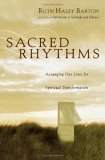More on this book
Community
Kindle Notes & Highlights
Read between
January 2 - January 9, 2020
Your desire for more of God than you have right now, your longing for love, your need for deeper levels of spiritual transformation than you have experienced so far is the truest thing about you. You might think that your woundedness or your sinfulness is the truest thing about you or that your giftedness or your personality type or your job title or your identity as husband or wife, mother or father, somehow defines you. But in reality, it is your desire for God and your capacity to reach for more of God than you have right now that is the deepest essence of who you are.
The stirring of spiritual desire indicates that God’s Spirit is already at work within us, drawing us to himself. We love God because he first loved us. We long for God because he first longed for us. We reach for God because he first reached for us. Nothing in the spiritual life originates with us. It all originates with God.
Often, those who accomplish what they set out to do in life are not those who are the most talented or gifted or who have had the best opportunities. Often they are the ones who are most deeply in touch with how badly they want whatever they want; they are the ones who consistently refuse to be deterred by the things that many of us allow to become excuses.
Jesus’ interactions with the people he came in contact with during his life on earth make it clear that desire, and the willingness to name that desire in Christ’s presence, is a catalytic element of the spiritual life.
By “unmediated” I mean a direct experience of God with nothing in between: an encounter with God that is not mediated by words, by theological constructs, by religious activity, by my own or other’s manipulations of my relationship with God. It is the practice that spiritual seekers down through the ages have used to experience intimacy with God rather than just talking about it.
But Jesus seems to have little time for their ministry reports. He is concerned about the bigger issue of how they will sustain their spiritual life rather than being distracted by outward successes.
One of the fundamental purposes of solitude is to give us a concrete way of entering into such stillness, so that God can come in and do what only God can do.
a deep current of truth that runs underneath everything else: All things have already been reconciled in Christ—even those people and things that seem broken beyond repair.
When I reengage my life in community with others and live from that place of union with God, there is indeed a peace that passes understanding and transcends the longing.
“The fact is there is nothing that we are doing that God could not raise up a stone in the field to do for him. The realization of this puts us in our true place. Though, lest we get too knocked down by such a realization of our insignificance, let me hasten to add that there is one thing that we alone can give God . . . and that is our personal love. No one else can give God our personal love. This is our great significance.”
Do not ask “How shall I pass this on?” but “What does it say to me?”
The Scriptures gave me a place to be and to breathe. I loved God because of what I learned about God from the Scriptures.
as God speaks to us through Scripture, we respond to what we read with our heart and soul rather that just our intellect.
When aspects of ourselves that were always meant to exist together are reintegrated, the result is a combustion of joy and vitality that goes far beyond the physical dimension. It is a spiritual vitality that speaks volumes about the abundance of our life in Christ.
The examen of consciousness involves taking a few moments at the end of each day to go back over the events of the day and invite God to show us where he was present with us and how we responded to his presence. We might ask ourselves, How was God present with me today? What promptings did I notice? How did I respond or not respond?
When we enter into the examen of conscience, we are willing to listen without defending and to see without rationalizing. We do not depend on our own morbid introspections or keen insights; rather, we surrender ourselves to the Spirit of God, who reveals truth to us as we are able to bear it. As God brings different areas to mind, we are willing to reflect on what contributed to the situation and how we might respond differently in the future. It is the willingness to allow God to guide the process that elevates it from a self-help project to a spiritual practice.
Discernment is first of all a habit, a way of seeing that eventually permeates our whole life. It is the journey from spiritual blindness (not seeing God anywhere or seeing him only where we expect to see him) to spiritual sight (finding God everywhere, especially where we least expect it).


